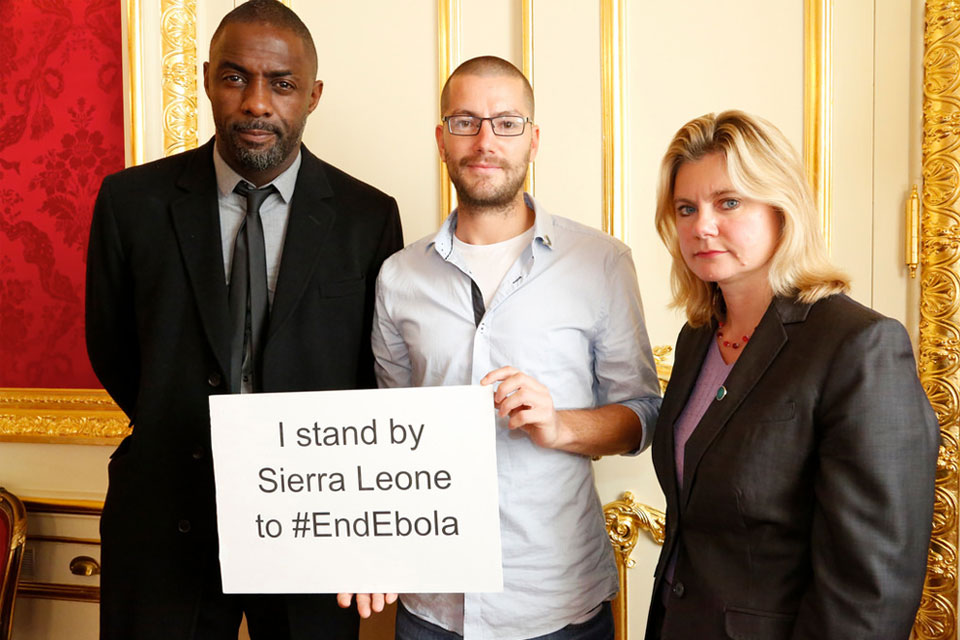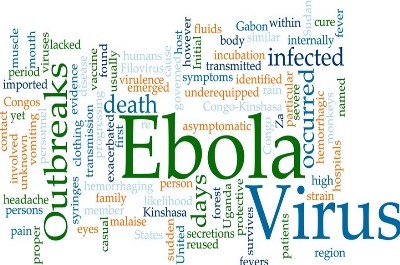Defeating Ebola from Lancaster House
Sierra Leone just recorded the highest number of Ebola casualties in a day as the fight to contain and eradicate the deadly Ebola virus continues. Quite alarming and scary to say the least! (Photo: British Ebola surviving nurse William Pooley)
Like in Liberia and Guinea, the situation in Sierra Leone is desperate and as it stands, it is almost impossible to assess how much more damage would be done before the disease could be contained.
World Health Organisation has warned of a potential catastrophe long ago before things started to get worst – at least not before the virus began to threaten Europe, America and the rest of the world.
People including women and children have been dying on an alarming rate; children rendered homeless and orphans and the situation remains bleak. So much has been done by the government, but certainly this is not just a fight for Sierra Leoneans – the situation on the ground is far more than something any single government can handle.
The Lancaster Conference on ‘Defeating Ebola in Sierra Leone’ organised by the British Foreign Office in London was meant to address these issues – but if for any reason the objectives of the conference were not adequately and appropriately achieved, one success story that came out of Lancaster House was that the world is finally begin to at least realised that Ebola is not just a Sierra Leonean or an African problem but a global epidemic that requires massive global response.
Recent cases of Ebola in the United States of America and Spain respectively are clear indication that the world needs to rally behind West Africa to bring this ugly nightmare to a dramatic end.
The Lancaster House Conference was perhaps the biggest ever Ebola conference held since the outbreak earlier this year having attracted some of the biggest and most influential humanitarian aid agencies and organisations around the world including the UN, WHO, World Bank, NGOs as well as government representatives and health experts who had pledged greater financial assistance, equipment and health personnel.
Prior to the conference, Sierra Leone’s High Commissioner to the United Kingdom His Excellency Edward Mohamed Turay, and other diplomatic officials of the High Commission had spent the last two weeks hanging heads with the British Foreign Office working on the modalities for a successful conference.
While the British authorities were working on attracting more aid and support from the International Community, the High Commission was working closely not only with the authorities in Sierra Leone, but also the Sierra Leonean Diaspora community.
“We are here to listen to you and see how best we can work together with you members of the Diaspora community to fighting this Ebola virus in your country,” British Parliamentary Under Secretary of State James Dudorige said at a meeting with the Sierra Leonean Diaspora community that preceded the donor conference.
Among the prominent personalities that graced the conference was Hollywood superstar actor Idris Elba, who had flown in from the United States to the conference on the invitation of the British government to give massive boost to the country he called ‘my home’.
“I am here in London for just one thing – to declare my interest in serving as a Messaging Ambassador for Sierra Leone,” says Elba who has strong Sierra Leonean background having born from a Sierra Leonean father and growing up in a densely populated Sierra Leonean community in East London.
The Hollywood star is already working with the British football authorities and Sierra Leonean mobile companies to start voice messaging on behalf of Sierra Leone not just for the fight against Ebola but also in the long run.
Elba was to have met Sierra Leone’s President Dr. Ernest Bai Koroma behind closed doors – ten minutes before the start of the Diaspora Conference but the latter cancelled his trip at the last minute due to unavoidable circumstances.
The Sierra Leonean leader was to have co-chaired the conference with the British Foreign Secretary Philip Hammond, but in his shoes was the International Development Secretary Justine Greening.
During the conference, participating countries discussed how the global community can provide an effective response to the crisis. They made pledges to support the international effort to defeat the disease, with both the UK and Sierra Leone urging them to contribute extra funding for hospital beds and staff.
Hammond disclosed that the UK has so far committed £125 million towards Ebola, adding, “as well as the financial commitment, I want to emphasise the huge contribution made by British troops and medics who are creating new capacity including health facilities in Sierra Leone. We are leading and coordinating the response, but we need international help and we have made significant progress in securing it.”
Britain’s commitment will include supporting 700 treatment beds to help up to 8,800 patients over six months. Further steps will also be taken to reduce the spread of Ebola across Sierra Leone by undertaking rapid trials of community care units designed to isolate Ebola cases more quickly and highlighting the risk of infection during traditional burial rites.
The UK will set up a series of pilot Sierra Leone community care units to give people who suspect they might be suffering from the disease somewhere to seek swift and accurate diagnosis and appropriate care.
There were also pledges from across the world including Australia (additional $10 million to the UN Trust Fund and $2 million to DFID), Cuba (63 Doctors and 102 nurses to Sierra Leone), Finland ($1 million through WHO and Red Cross), Canada and Philippines as well as the Children’s Investment Fund Foundation – a leading charity, which also pledged £12.4 million ($20 million) for the Ebola effort, £9.3 million ($15 million) of which will go to Sierra Leone.
Sierra Leone’s Health minister Dr. Abubakar Fofanah made an emotional speech via video link from Freetown in which he explained the realities on the ground in Sierra Leone.
The conference also heard from British Ebola surviving nurse William Pooley who was unable to control his emotion as he burst into tears while giving his account of events in Sierra Leone where he contracted the disease and was rushed to Britain where he recovered after being successfully treated.
Before Ebola struck, Sierra Leone was the fastest growing economies in the world; as well as enjoying rapid growth in the United Nations Human Development Index among other things with massive infrastructural development having taken place over the past few years.
Since the outbreak about eight months ago, the country’s economy has faced rapid decline and there are fears it might head for an uncontrollable disaster if the world fails to respond as urgent as possible.
The Ebola outbreak is an unprecedented human tragedy and the UN has declared it a public health emergency requiring international response;
The International Community must urgently step up its response by committing the necessary financial recourses as well as critical capabilities – from medical experts to transport to vital supplies.
The Lancaster House Ebola Conference has already provided that platform and therefore decisive actions need to be taken and implemented if we are to make significant breakthrough in the fight against the world’s deadliest disease.
Stay with Sierra Express Media, for your trusted place in news!
© 2014, https:. All rights reserved.






